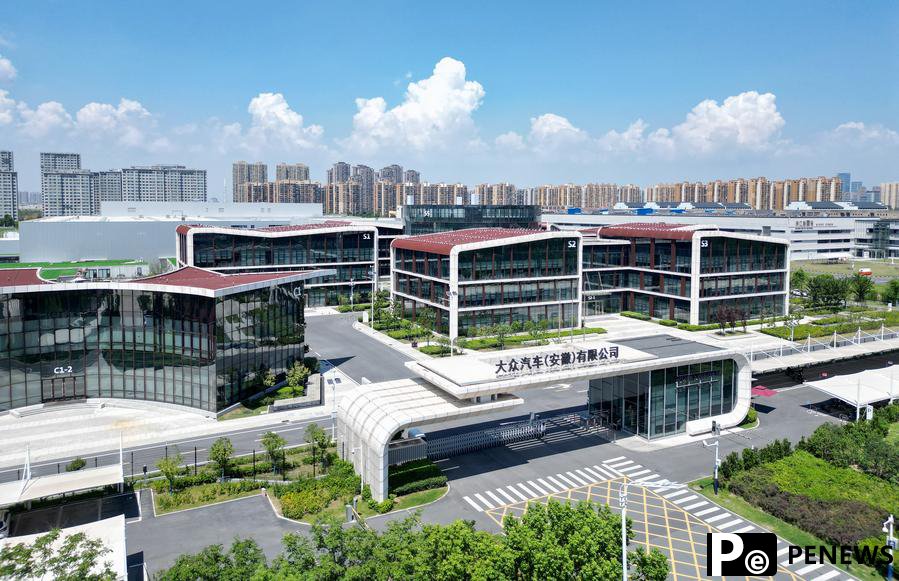Home>>
German firms ramp up investment, not to miss out on China's growth opportunitiesBy Li Hanlin (Xinhua) 08:18, August 26, 2024
BERLIN, Aug. 25 (Xinhua) -- German businesses are growing increasingly optimistic about China's innovative vitality and open market benefits, leading to a surge in their investments in the Chinese market.
German investments in China have shattered records, reaching an unprecedented 7.3 billion euros (8.2 billion U.S. dollars) in the first half of 2024, according to the latest data from the Central Bank of Germany.
This momentum continues unabated, highlighting the deepening economic ties between the two countries as they mark the 10th anniversary of the China-Germany comprehensive strategic partnership.

An aerial drone photo taken on Aug. 20, 2023 shows a view of Volkswagen (Anhui) Automotive Company Limited in Hefei, east China's Anhui Province. (Xinhua/Guo Chen)
BOOMING INVESTMENT
Several prominent German companies have demonstrated their long-term commitment to China through significant increases in investments.
Volkswagen is investing 2.5 billion euros (2.8 billion dollars) in the Chinese city of Hefei to establish its largest R&D center outside Germany. BMW is boosting its investment in its Shenyang plant in northeast China by 20 billion yuan (2.8 billion U.S. dollars) to upgrade production capacity and boost innovation. Bayer revealed a 600-million-yuan (84.2-million-dollar) investment for a new supply center in Qidong in coastal Jiangsu Province.
This consistent increase in investment not only acknowledges China's vast market potential but also reflects confidence in its infrastructure, comprehensive industrial chain and business environment.
During the 7th China International Import Expo Germany Roadshow in June, Wu Zhengping, deputy director general of the China International Import Expo Bureau, emphasized the strong participation of German companies in the expo, noting the number of exhibitors and the space they occupied were the highest among European nations. This robust involvement signals the high level of confidence that German businesses have in China's economic prospects.
"Over 90 percent of German leading global companies have partnerships with China. Any company aspiring to lead in the global market must collaborate with China," said Walter Doring, chairman of the Academy of German Hidden Champions, adding that German firms embedded in the Chinese market face bright prospects and continued growth opportunities that will enhance competitiveness worldwide.
Zhai Qian, minister of economic and commercial affairs at the Chinese Embassy in Germany, noted that Germany's strengths in traditional sectors like machinery, automotive and pharmaceuticals complement China's advances in green development and the digital economy. This synergy injects new dynamism into bilateral economic ties and pushes cooperation to new heights.

A staff member of German company Karcher displays a product at the fourth China International Consumer Products Expo (CICPE) in Haikou, south China's Hainan Province, April 14, 2024. (Xinhua/Yang Guanyu)
DRIVING FACTORS
Behind the sustained increase in German investment in China lies confidence in the country's long-term economic prospects, positive signals emanating from China's high-level opening-up and a continually improving business environment.
Tobias Wahl, board chairman of the Hawk brand at Karcher Group, highlighted how his company successfully introduced deep-cleaning concepts to the Chinese market, yielding impressive results. This success further strengthened Karcher's commitment to the Chinese market, with the company now investing 2 billion yuan (280.7 million dollars) to advance its localization strategy.
"German companies approach investment decisions with a strong focus on market potential and profitability, carefully analyzing global markets to identify regions with the highest opportunities and growth potential," said Zheng Chunrong, director of the German Studies Center at Tongji University.
The sustained growth of German investment in China highlights the market's significant scale and promising prospects. For many German companies, China remains a preferred hub for global supply chain layouts.
Michael Schumann, chairman of the Board of the German Federal Association for Economic Development and Foreign Trade, emphasized that what previously had to be imported from Germany or other parts of Europe is now sourced from China. This shift has led to the creation of production models such as "In China, For China" and "In China, For the World."
China's growing innovation leadership is fostering greater synergy between China and Germany.
"China's significance surpasses mere consumption; it has become a hub of innovation, leading the transformation across various sectors such as electrification, smart mobility, artificial intelligence, digitalization, and energy efficiency," said Stefan Hartung, chairman of the board of management of Robert Bosch GmbH.







